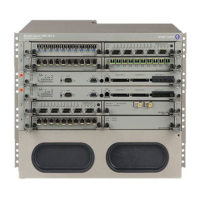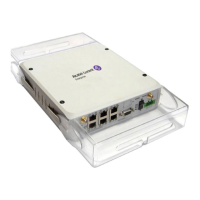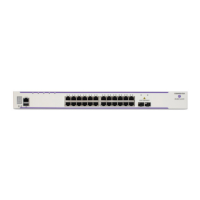7705 SAR Interfaces
7705 SAR OS Interface Configuration Guide Page 39
Remote Loopback
EFM OAM provides a link-layer frame loopback mode that can be remotely controlled.
To initiate remote loopback, the local EFM OAM client sends a loopback control OAM
PDU by enabling the OAM remote-loopback command. After receiving the loopback
control OAM PDU, the remote OAM client puts the remote port into local loopback mode.
To exit remote loopback, the local EFM OAM client sends a loopback control OAM PDU
by disabling the OAM remote-loopback command. After receiving the loopback control
OAM PDU, the remote OAM client puts the port back into normal forwarding mode.
OAM PDUs are slow protocol frames that contain appropriate control and status information
used to monitor, test, and troubleshoot OAM-enabled links.
When a port is in local loopback mode (the far end requested an Ethernet OAM loopback),
any packets received on the port will be looped back, except for EFM OAM PDUs. No data
will be transmitted from the node; only data that is received on the node will be sent back
out.
When the node is in remote loopback mode, local data from the CSM is transmitted, but any
data received on the node is dropped, except for EFM OAM PDUs.
Remote loopbacks should be used with caution; if dynamic signaling and routing protocols
are used, all services go down when a remote loopback is initiated. If only static signaling
and routing is used, the services stay up. On the 7705 SAR, the Ethernet port can be
configured to accept or reject the remote-loopback command.
802.3ah OAM PDU Tunneling for Epipe Service
Customers who subscribe to Epipe service might have customer equipment running 802.3ah
at both ends. That is why the 7705 SAR is configured to tunnel received OAM PDUs to the
other end through the existing network using MPLS or GRE. This is the default functionality
and is not user-configurable.
For example, the OAM PDU could be generated by a tester or end-user device at the MTSO
end to test the whole circuit. The only way to ensure that the OAM traffic is transported from
the MTSO to the site is through the use of Ethernet pseudowires to tunnel the OAM traffic.
Note: This feature applies only to port-based Epipe SAPs because 802.3ah runs at port
level, not at VLAN level.
